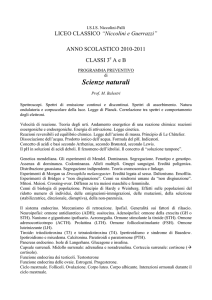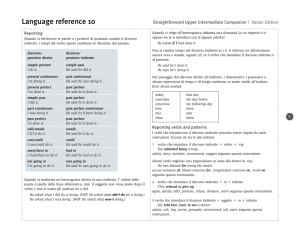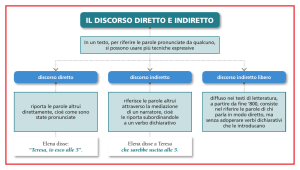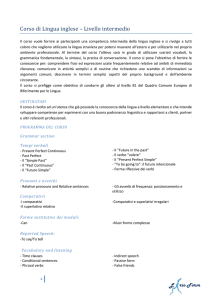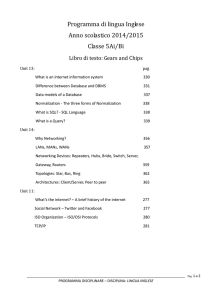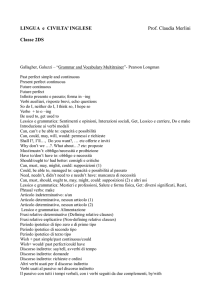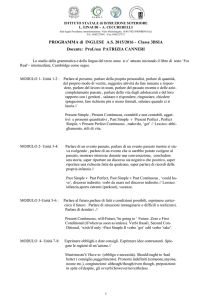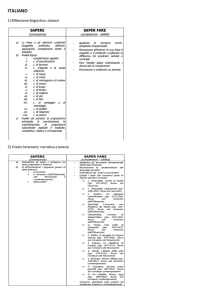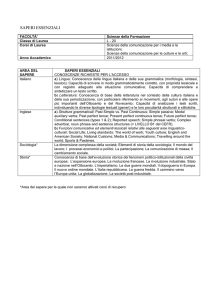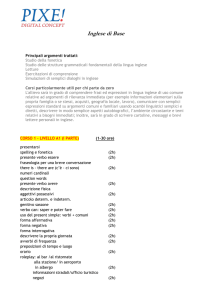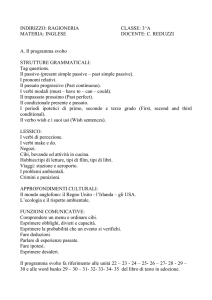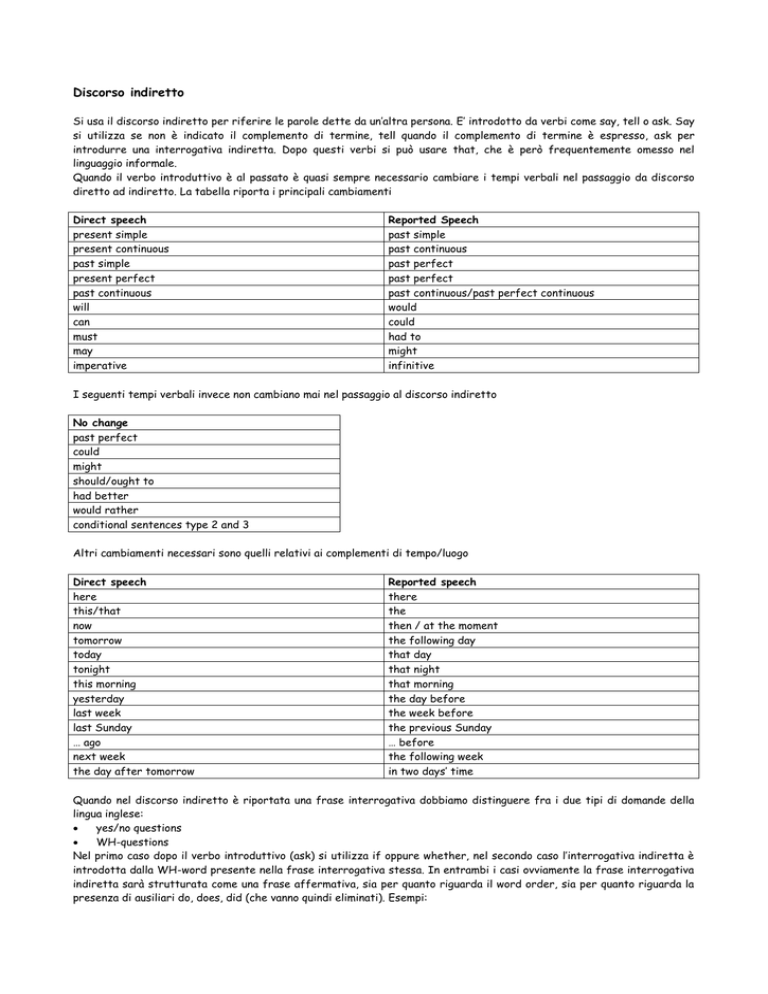
Discorso indiretto
Si usa il discorso indiretto per riferire le parole dette da un’altra persona. E’ introdotto da verbi come say, tell o ask. Say
si utilizza se non è indicato il complemento di termine, tell quando il complemento di termine è espresso, ask per
introdurre una interrogativa indiretta. Dopo questi verbi si può usare that, che è però frequentemente omesso nel
linguaggio informale.
Quando il verbo introduttivo è al passato è quasi sempre necessario cambiare i tempi verbali nel passaggio da discorso
diretto ad indiretto. La tabella riporta i principali cambiamenti
Direct speech
present simple
present continuous
past simple
present perfect
past continuous
will
can
must
may
imperative
Reported Speech
past simple
past continuous
past perfect
past perfect
past continuous/past perfect continuous
would
could
had to
might
infinitive
I seguenti tempi verbali invece non cambiano mai nel passaggio al discorso indiretto
No change
past perfect
could
might
should/ought to
had better
would rather
conditional sentences type 2 and 3
Altri cambiamenti necessari sono quelli relativi ai complementi di tempo/luogo
Direct speech
here
this/that
now
tomorrow
today
tonight
this morning
yesterday
last week
last Sunday
… ago
next week
the day after tomorrow
Reported speech
there
the
then / at the moment
the following day
that day
that night
that morning
the day before
the week before
the previous Sunday
… before
the following week
in two days’ time
Quando nel discorso indiretto è riportata una frase interrogativa dobbiamo distinguere fra i due tipi di domande della
lingua inglese:
yes/no questions
WH-questions
Nel primo caso dopo il verbo introduttivo (ask) si utilizza if oppure whether, nel secondo caso l’interrogativa indiretta è
introdotta dalla WH-word presente nella frase interrogativa stessa. In entrambi i casi ovviamente la frase interrogativa
indiretta sarà strutturata come una frase affermativa, sia per quanto riguarda il word order, sia per quanto riguarda la
presenza di ausiliari do, does, did (che vanno quindi eliminati). Esempi:
Do you want to go to the cinema? He asked me if I wanted to go to the cinema
How did you hear about this place? He asked me how I had heard about that place
Nel caso della interrogativa indiretta negativa invece l’ausiliare rimane. Esempio:
Why don’t you like her? He asked me why I didn’t like her
L’imperativo utilizzato nel discorso indiretto può esprimere sia un comando, sia una richiesta.
Comando : tell + infinito con to
“Wait! Wait!” I told him to wait
Richiesta : ask + infinito con to
“Help me, please” I asked her to help me
OTHER REPORTING VERBS
Nel discorso indiretto inoltre è possible utilizzare verbi che esprimono la funzione stessa del discorso, che quindi
interpretano ed esplicitano il messaggio che viene riferito.
La tabella riporta significati e costruzioni sintattiche.
Nel riportare affermazioni e dichiarazioni si possono usare:
admit
agree
answer
apologise
assure
boast
claim
complain
congratulate
decide
declare
deny
explain
inform
insist
offer
promise
refuse
reply
report
ammettere
essere d’accordo
rispondere
scusarsi
assicurare
vantarsi
sostenere
lamentarsi
congratularsi
decidere
dichiarare
negare
spiegare
informare
insistere
offrirsi
promettere
rifiutare, rifiutarsi
replicare, rispondere
riportare, riferire
admit doing sth / admit that…
agree that / agree with sb
answer sb that …..
apologise for doing sth
assure sb that
boast that….
claim that….
complain that….
congratulate sb on sth / congratulate sb on doing sth
decide that… / decide to do sth
declare that…..
deny doing sth / deny that….
explain that…..
inform sb that…..
insist that sb do sth / insist that sb should do sth
offer to do sth
promise to do sth / promise sb that….
refuse to do sth
reply that….
report that…..
Per riferire ordini, richieste, avvertimenti e suggerimenti:
advise
beg
convince
encourage
forbid
invite
order
persuade
recommend
consigliare
pregare, chiedere
convincere
incoraggiare
proibire
invitare
ordinare
convincere, persuadere
raccomandare, consigliare
remind
suggest
warn
ricordare qlc a qualcuno
suggerire, proporre
avvisare, avvertire
advise sb to do sth
beg sb to do sth
convince sb to do sth
encourage sb to do sth
forbid sb to do sth
invite sb to do sth / invite sb to sth
order sb to do sth
persuade sb to do sth
recommend doing sth / recommend that sb should do sth /
recommend sb to do sth / recommend that sb do sth
remind sb to do sth
suggest doing sth / suggest that sb should do sth
warn sb (not) to do sth

